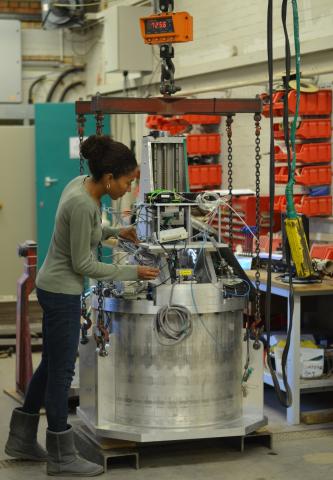Njemile is a PhD student in the Geotechnical and Environmental Research Group

Background – how did you get into Engineering?
Initially, I applied to study maths and physics at university because these were subjects that I liked at school. During my gap year I worked at a civil engineering contracting company who were building a stadium for the FIFA U-17 World Cup. I found the whole process of transforming an empty plot of land to a national sporting facility fascinating. In particular, I was intrigued by the engineering involved to make sure that the structure was stable and safe. I resubmitted an application to study Civil Engineering.
What are you doing now and what are your plans for the future?
I am a third year PhD candidate in the Geotechnical and Environmental Research Groupat the University of Cambridge. My research area is related to shafts, which are essentially big holes in the ground to facilitate tunnelling projects. It is costly to construct shafts and to provide protective measures for nearby buildings and services. Therefore, I design and build small models of shafts which I test in a centrifuge. During the test I monitor the performance of the shaft and the surrounding ground and I will use the monitoring data to develop a cost effective design procedure for shafts.
Apart from the PhD, I supervise undergraduate engineering students and provide mentorship to young people via the Science, Technology, Engineering and Mathematics Network (STEM).
When I graduate I would like to work in industry on projects that have some research element. I would also like to be involved in more outreach activities for young people.
What motivates/interests you?
It is very important to me that the projects I work on have some benefit to society. Examples of two projects that I have worked on are the upgrade of rural roads and bridges in Trinidad and Tobago and Crossrail and a new high capacity railway in the UK. I feel motivated when I am solving problems, working in teams and when I deliver a successful outcome.
How have you managed to balance family life and other interests with your career?
Having a routine helps me to work efficiently and effectively and allows me to spend quality time with my two year old son and husband. I always stop work between 5pm and 8pm and on weekends I try to work in the evenings only. Any other activities or hobbies are done either early in the morning or at night, for example learning French, going on photography walks or catching up with friends and family.
Do you have any role models?
I have several role models. My parents, who provided a stimulating, fun and nurturing environment for me and my siblings. Helen Scholes, an engineer at Geotechnical Consulting Group, who encouraged and inspired me as a young engineer in a male-dominated field. My PhD supervisor, Professor Lord Robert Mair, who helped me develop self-confidence and empowered me to explore new experimental techniques using the geotechnical centrifuge at Cambridge. Elizabeth Healy, a television broadcaster who has a PhD in Neurophysiology and co-founded a global education charity, who taught me the importance of doing something that you love and helped me to improve my presentation skills.
Do you have any advice for women who are considering pursuing a career in Engineering?
Engineering is an exciting, diverse and fulfilling career with great opportunities for women to succeed. Do not be daunted by lack of gender diversity in this field, instead find a mentor so that every success you can imagine for yourself is realised.

